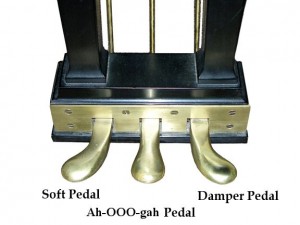 It started with a crossword puzzle.
It started with a crossword puzzle.
The clue was DOWNPLAY. I already had the first four letters, so I knew it was SOFT—–.
My first inclination was SOFTSELL, which is the jargon for when the salesperson pretends to be your friend and wants to know all about your pets and your hobbies instead of demanding that you buy, buy, buy something right now. In contrast, the “buy now” seller is employing the HARD SELL.
But SOFTSELL did not fit, because the answer required nine letters, and SOFTSELL has only eight. But SOFTSELL made me think of the synonym SOFT PEDDLE, because peddling is the same thing as selling. But SOFTPEDDLE does not fit either, even without the space.
Eventually I got the answer by solving the cross-clues and was shocked to discover that I had been right the first time, except that I was also completely wrong. The answer was SOFTPEDAL. PEDAL like the part of the bicycle crank where you apply your foot.
I complained about this strange solution to my wife, who immediately agreed with the puzzle composer. “Oh,” she said, “Just like the SOFT PEDAL of a piano.”
 So I appealed this to the English Language Police. They immediately dismissed my case with prejudice, telling me that I was a dunce for not knowing the correct and only spelling and origin of this phrase. In their all-knowing eyes, SOFT PEDAL is based on the well-known concept that to soften a note on the piano, one depresses the SOFT PEDAL. Somehow through the fog of time this has come to have the general meaning of de-emphasizing or downplaying, as in;
So I appealed this to the English Language Police. They immediately dismissed my case with prejudice, telling me that I was a dunce for not knowing the correct and only spelling and origin of this phrase. In their all-knowing eyes, SOFT PEDAL is based on the well-known concept that to soften a note on the piano, one depresses the SOFT PEDAL. Somehow through the fog of time this has come to have the general meaning of de-emphasizing or downplaying, as in;
The president SOFT PEDALED his new call for tax increases, labeling them as “reverse income enhancements.”
This makes no sense to me, even though the English Police have documentary evidence that SOFT PEDAL is how the phrase originated, and that only morons and uneducated twits spell it SOFT PEDDLE and think it is related to selling. I still have a hard time buying it, for two reasons:
- Less than 8% of the population knows how to play the piano. So that makes it hard for me to believe that the musical jargon “to soft pedal” came into popular usage. That is as logical as saying the phrase “black and white photography” actually had its origin with the piano, in reference to the colors of its keys.
- Even people who do play the piano and understand the operation of the three pedals (I always thought they were for the gas, brake and clutch) don’t say, “I’m going to SOFT PEDAL that measure.” They always say “I’m going to use SOFT PEDAL in that measure,” or “I will play that measure with SOFT PEDAL.” It is not common to use SOFT PEDAL as a verb, the way it is commonly used by everybody else when they want to sneak in something under the radar.
So, again, I am the object of scorn and ridicule in my use of the English language, not because I am stupid or poorly educated or lacking in reason, but precisely because I am smart. I used my knowledge of synonyms, my ability to recognize patterns, and logical deduction to arrive at exactly the wrong answer. That is why I call English stupid. The smarter you are, the more mistakes you are likely to make using it, because its patterns and rules make no sense.
Not convinced? How about some examples:
When I speak, I make a speech.
When the levee leaks, the water leaches through.
Beginning to see a pattern?
If the levee breaks, water will gush through the breach.
But if I blow my beak (as in nose), does it produce a beach?
If you sneak a peek, do you snitch a peach?
And when it begins to reek, does it make an awful reach? No, a stench, which might have come from a steenk, (or stink in the modern spelling.)
There does seem to be some kind of pattern, but it is not very useful. More often than not, if you rely on learned patterns to help you with English usage, they will lead you astray (notice nothing ever leads you ahome.) Like the animals you can see in puffy clouds, these patterns are all in your head.